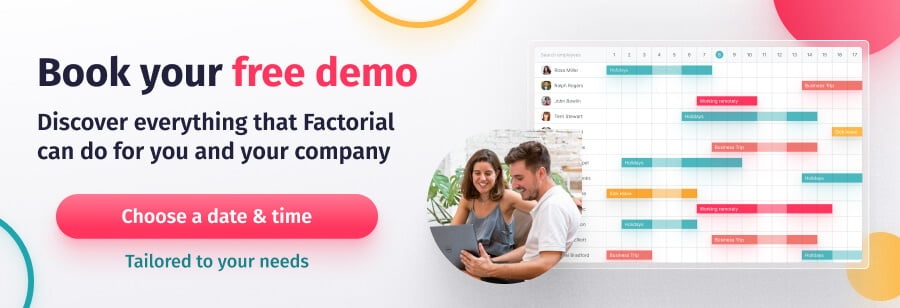Are you questioning how ‘employee tenure’ influences company culture and staff retention?
This article reveals tenure’s role in business stability and team fulfilment. Read on to learn the causes behind different tenure lengths and how they affect organisational health.
What is Employee Tenure?
Employee tenure is the length of time an individual spends with the same organisation or working for the same employer. It’s used as as indication of their long-term commitment and understanding of company policies. Usually, the average tenure fluctuates based on industry, age, and other factors.
Understanding is pivotal for the modern HR strategy, as the average tenure of an employee mirrors the company culture, job security, and opportunities for career advancement provided by an employer. It’s like a two-sided coin, where one side represents the loyalty and depth of expertise of long-tenured employees, and the flip side reveals short-tenured employees’ diverse skills and adaptability.
Why is Tenure Tracking Important?
HR professionals rely on tracking employee tenure for several reasons:
- Offers insights into job satisfaction, employee loyalty, and organisational stability.
- Indicates how effectively an organisation manages its employees and retains talent in the long term.
- Helps remote companies understand work culture alignment and values.
Additionally, it serves as a preventive measure against high turnover rates and any solid retention strategy.
Employee Tenure Trends

Many factors influence employee tenure. The public sector, for instance, boasts a higher average tenure than the private sector, hinting at the role job security might play in these figures.
Age and Tenure
Age plays a significant role in tenure, with younger workers generally having shorter tenure while older workers tend to stay with their employers longer.
According to UK research, 8.7% of 35 to 44s haven’t remained employed by the same employer for over 6 months, whereas this number is only 2.15% amongst the 45 to 54s.
Short vs. Long Employee Tenure
Whether an employee stays at a company for the short-term or long-term, they can bring different kinds of benefits, which are listed below.
Short Tenure Employees
These types of employees often ‘job-hop’, i.e. don’t stay in one company for longer than 2 years, often in search of new challenges and professional development. Of course, there are downsides to losing employees after such a short time, but this group of employees can often bring fresh perspectives and contributions, especially in dynamic industries. They frequently change jobs in pursuit of:
- New challenges
- Career advancements
- Acquiring diverse skills
However, these benefits come with their own challenges, such as difficulty building deep work relationships and proving their value to an employer due to their limited time in each position.
Long Tenure Employees
Long-tenured employees often bring more expertise and knowledge to an organisation (but not always)! As they are more likely to know a company inside and out, they are the ones who often implement new processes to streamline the way a company works.
They play a crucial role in building strategic alliances that are important for business growth and they serve as mentors, helping to support junior staff members and share knowledge across teams.
Strategies to Lengthen Employee Tenure
Companies need to think about ways to keep top talent on board for longer if they want to reap the benefits that come with having mostly long-term employees in their workforce. Here are a few ways they can do that:
Fostering a Positive Work Environment
This is easier said than done! Mostly, it involves:
- Creating a culture of open communication
- Recognition and appreciation for employees, perhaps in the form of an employee reward programme
- Promoting employee wellbeing
- Celebrating work anniversaries and milestones as a team
- Providing stock options and bonus schemes
- Conducting regular employee engagement surveys
- Practising active listening
Encouraging teamwork, acknowledging achievements, and simple gestures of appreciation, such as providing meals on busy workdays, can also contribute to a positive work environment and influence employee tenure. It’s the little things that make a big difference!
Providing Career and Development Opportunities
Providing learning and development opportunities, such as training, mentorship, and coaching, supports continuous employee growth and retention.
Research has continuously shown this to be true. For example, a 2023 LinkedIn report found that 93% of companies are worried about employee retention, but they consider learning opportunities as the most impactful way to keep their staff.
Offering opportunities for career advancement, allowing employees to develop new skills at their own pace, and implementing job shadowing as part of a broader development strategy are all effective ways to retain talent and increase job tenure.
Celebrating Milestones
Recognising and rewarding tenured employees gives them a sense of your appreciation, which can only improve their motivation and satisfaction! Some ways to celebrate this kind of milestone include:
- Implementing a formal Service Awards programme
- Presenting a rotating trophy to employees who reach significant tenure milestones
- Offering additional paid time off to employees who have been with the company for a certain number of years
Recognition can take many forms, from public acknowledgement in company newsletters or on social media to personalised gifts and experiences. The key is making sure it is meaningful and personalised to each employee; whether a gesture is genuine or not is always more obvious than you think! An automated or generic message won’t convince employees that their unique contributions are truly valued.
Integrating Tenure into HR Strategy
When considering how to lengthen employee tenure, HR teams must consider every stage of the talent management cycle. This starts from day one, as employees who experience a poor onboarding are two times more likely to search for another job soon. Implementing comprehensive and extended onboarding programmes can help new hires better adjust to company culture and processes, improving retention. This could mean establishing mentoring programmes to help with:
- Skill development
- Building cross-departmental relationships
- Enhancing the integration of new hires into the company culture
Tenure Data for Strategic Decision Making
HR can also use tenure data for strategic decision-making. This includes:
- Crafting tailored employee benefits and compensation packages, depending on results from engagement surveys
- Identifying skill gaps and training needs, which can be done using performance management software
- Aligning with employment market dynamics to balance the workforce by mixing tenured expertise with fresh talent
- Ensuring proper succession planning
By identifying skill gaps and training needs, especially after workforce disruptions like the ‘Great Resignation’, HR can implement effective training programmes to address these gaps.
Employee Tenure FAQs
What is an example of employee tenure?
An example of employee tenure is a professor teaching at a university for over 20 years, which is considered long tenure.
What does job tenure mean in UK?
Job tenure in the UK refers to the length of time an employee has been continuously employed by the same employer or within the same job position, and it is measured in years or months to assess an individual’s work history and commitment.
How do you calculate employee tenure?
To calculate employee tenure, subtract an employee’s start date from the current date or termination date when an employee has departed and calculate the average for all employees.
What is the average tenure of an employee?
The average tenure of an employee is around 2-4 years. Shorter tenure is typically around two years or less.
How does tenure impact organisational health?
Higher employee tenure can lead to lower turnover rates, increased stability, and organisational productivity. Additionally, long-tenured employees play a crucial role in preserving organisational memory and ensuring continuity and tradition within the company.


